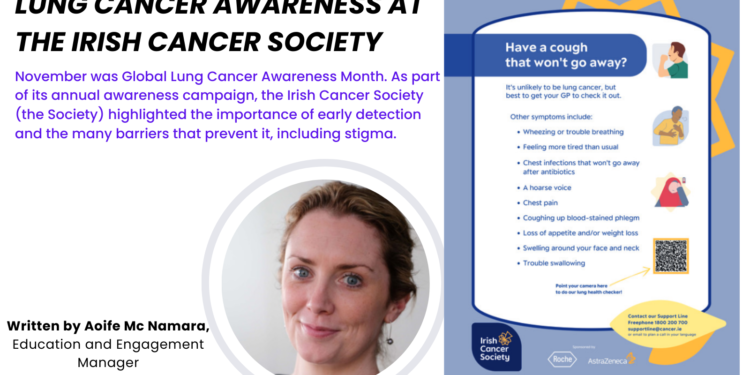November was Global Lung Cancer Awareness Month. As part of its annual awareness campaign, the Irish Cancer Society (the Society) highlighted the importance of early detection and the many barriers that prevent it, including stigma.
Lung cancer is one of the most common cancers worldwide. In Ireland, lung cancer is the fifth most common cancer, with almost 2,700 people diagnosed each year. Less than a third of lung cancer patients are diagnosed at an early stage. Later diagnosis means more challenging disease management and little chance of cure. Sadly, more Irish people die from lung cancer than from any other form of the disease.
Early detection is vital. Multiple global large-scale studies have conclusively shown that lung cancer screening works in detecting more lung cancers at earlier stages. However, in the absence of a national screening programme, early detection in Ireland is reliant on patients presenting to their GP sooner rather than later. Despite multiple annual awareness campaigns, recent data shows people are often still unclear of the signs and symptoms. When they do notice something wrong, it is well documented that patients can delay presentation because of the stigma associated with lung cancer and smoking.
The Global Lung Cancer Coalition (GLCC) is an alliance of patient organisations committed to increasing awareness and understanding of lung cancer and campaigning to improve lung cancer outcomes for all. In 2023, the GLCC commissioned a multi-national study to understand attitudes towards lung cancer, levels of symptom awareness among the public and views on lung cancer screening. The study was undertaken in 29 countries, including Ireland. Responses were received from at least 1,000 adults per country. Data was weighted using age, gender and region to produce a representative sample in each country.

Written by Aoife Mc Namara, Education and Engagement Manager
Over 28% of Irish respondents said they did not know any symptom of lung cancer. Worryingly those at highest risk, people who currently smoke/ have smoked were more likely to report not knowing any symptoms compared to people who have never smoked (30.69% v 23.58%).
To understand attitudes to lung cancer, participants were told that: “Lung cancer is mainly caused by smoking cigarettes and other tobacco products”. They were then asked, whether they have less sympathy for people with lung cancer than other types of cancer. In Ireland, 39.92% agreed with the statement that they had less sympathy for people with lung cancer.
Public health campaigns around the world have traditionally highlighted the link between tobacco and lung cancer in an effort to educate on risk reduction. However, many now argue that this public health approach has in fact led to the stigmatisation of lung cancer patients. Stigma is not normally associated with other cancers, yet on hearing a lung cancer diagnosis, people often respond with ‘Did they smoke?’ The strong association between tobacco and lung cancer has created the belief that it is a self-inflicted disease. No other cancer suffers from the same level of blame.
Early detection of lung cancer is vital, now more than ever. Preliminary data from the National Cancer Registry of Ireland earlier this year confirmed that 14% less lung cancer cases were diagnosed in 2021 than projected because of the impact of the pandemic. Our clinical colleagues are reporting more delayed diagnoses and poorer survival outcomes because of this. Our message all year round, but especially during Lung Cancer Awareness Month, is that members of the public should to be aware of the signs and symptoms of lung cancer and if or when they notice any of these symptoms, they should engage with their GP immediately.
The Irish Cancer Society has long supported the introduction of lung cancer screening to save lives and continues to call for the Government and the National Screening Service to work together to launch lung cancer screening. In the GLCC study, 88.82% people agreed there should be a national lung cancer-screening programme to help people with lung cancer get diagnosed early.
Throughout November and into December, the Irish Cancer Society will be hosting a series of Lung Cancer Awareness Road Shows and is calling on the public in these locations to come along, ask questions and meet with our cancer nurses. Our Support Line nurses are available to talk to anyone who is concerned about lung cancer on Freephone 1800 200 700, Monday – Friday.
For more information and support, visit www.cancer.ie/lung
For more information about this study and the work of the GLCC please visit: www.lungcancercoalition.org









